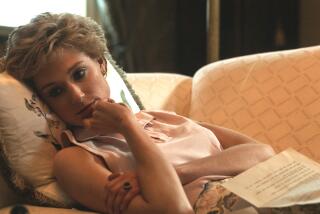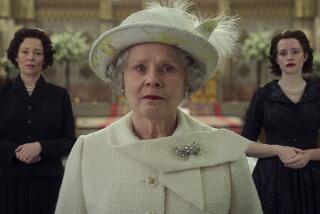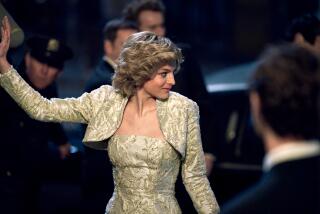The Royal Democrat
- Share via
WASHINGTON — Diana, princess of Wales, was buried yesterday, but in a most profound sense, reports of her death have been greatly exaggerated. It is not only that she will haunt from her grave the constipated antiquity that is the royal family. To understand why Diana’s memory marches triumphantly on and why something essential about her still lives, just look around the modern Britain that she, more than any other single person, embodied.
Lady Di, as we first called her, came into our lives in 1980, at the beginning of the Thatcher era, when Britain was a far different country. It was then economically the sick man of Europe, beset by labor troubles and massive strikes organized by a powerful trade-union movement that still virtually owned the Labor Party. And in 1980, Britain had been under Labor governments for 12 of the last 16 years. It was a Britain beset by racial problems, with Liverpool and London’s Brixton district about to explode into riot. It was an old and tired country, adrift without its empire, like a decaying mansion whose owners try to keep up appearances by selling off the family silver.
And look at Britain now. It has the most vibrant economy in Europe, with an export boom and unemployment at 5%, less than half the levels in France and Germany. The new Labor government based its electoral appeal on its declaration of independence from the trade unions. It is the software, services, media, financial and foreign investment center of Europe. And London is the most fashionable city, with the clothing designers, pop stars, artists and even the chefs who make it the most exciting and cosmopolitan place on the other side of the Atlantic.
In its government, its economy and its mood, Britain has become a young country again. And the first symbol of the profound transformation to come was Diana’s wedding--also, by coinci-dence, the first moment of British pageantry and regal splendor to be paraded before the new global TV audience. It was the start of the global cult of Diana, and we saw last week how far her aura has grown beyond the royal family, beyond Britain and beyond even the conventional orbit of celebrities. Other, conventional, celebrities do not put the flags at half-mast in Bosnia, do not get AIDS victims in California and limbless mine victims in Angola joining the grief.
The second symbol of the new Britain came the year she gave birth to Prince William. In the stunning military victory of the Falklands War, the old lion showed some very modern teeth to go with the traditional resolve and broke out of that depressing sense of decline evident since the end of World War II. Then came the decisive set-piece battle of Britain’s old class war: the crushing defeat by Margaret Thatcher’s government of the miners’ strike, swiftly followed by the wave of privatizations of nationalized industries and the revolution in the tax system that made Britain the most pro-enterprise economy in Europe.
The making of the new Britain was Thatcher’s achievement, but its symbol was Diana, who was changing and growing just as dramatically as the country. Remember that she was picked to be the future king’s wife by the Queen Mother, and the essential part of her job description was that she be a virgin. The Lady Di the world first encountered in 1980 was a shy and hesitant girl, dutifully awed by the austere grandeur of the older man she was to marry.
The only clue to the way Diana would grow into the most glittering symbol of the new Britain was that most telling of attributes to any English ear: her accent. She did not speak with the cut-glass vowels of the old ruling class and of her husband. In a country long attuned to read the codes of class from the briefest of phrases, Diana sounded like “one of us,” rather than “one of them.” Hers was not the master tongue of the court nor of Oxford, but what we call Estuary English--the speech of London and the Thames shoreline. One of the estuary counties is Essex, and “Essex Man” became demographers’ shorthand for the archetypal Thatcher voter: The upwardly mobile voter who was born into the working class but was buying his own home, going abroad for vacations, buying stocks and opening his own business.
Like most of her contemporaries, however expensively educated, Diana sounded like the new Britain, and she broke out of the old constraints of the court to have fun with her peers. She and Sarah Ferguson, the duchess of York, joined in the health-club and trendy-restaurant lifestyle of the new London. They visibly had fun in the way the royals did not, breaking out of the traditional royal bubble.
Even as Diana grew more miserable in her loveless marriage, and as the royal family tried to restrain her energies and constrain her exuberance, the British public was becoming aware we were getting two kinds of royal family. There was the old model, of stiff upper lips and the country-squire life of huntin’ and shootin’ and a strangulating, aloof self-control in public--and there was Diana’s promise of something new, a monarchy as modern and exciting and inclusive as Britain felt it was becoming.
Diana was not just young and beautiful and glad to share her grace with the public. She hugged people, from young children to AIDS victims, she laughed and danced and went to rock concerts and joked about the popular TV shows she liked to watch. Her friends were Elton John and Gianni Versace, and she liked to flirt and to woo the camera with coquettish glances. The royals were deliberately frumpy where she was even more determinedly glittering. They were bread, and she was circus. Where the royal family was reserved and exclusive, she was open and welcoming.
She broke the code of politics. She began with the usual good works, of safe charities for the opera and children, but then began to use her celebrity to bully the government over AIDS, the homeless and her passionate determination to ban land mines. She understood the media, using it as cunningly as it used her. She telephoned journalists at home and came to discreet, off-the-record sessions with editorial boards.
And she broke the code of omerta, the rule of silence about life inside the palace. As her marriage crumbled with the prince, who has since told us he “never loved her,” she went public with the news of Prince Charles’s adultery with Camilla Parker-Bowles. When Diana said on national TV that “with three of us in it, the marriage was getting a bit crowded,” she declared a kind of war on the privy hypocrisies of the old monarchy.
Understandably, the old guard of the royal family and establishment hated her for breaking their rules, and for showing up the inadequacy of their aging monarchy in a fast-changing Britain. With some justice, they dismissed her as an empty-headed woman who would lose her popularity as she lost her looks. They thought it was a big deal when they removed her formal title “Her Royal Highness” as part of the price of the divorce. And strangest of all, they assumed the British public would end its infatuation once she started dating a swarthy Egyptian-born playboy called Dodi al Fayed.
It would be difficult to get modern Britain more thumpingly wrong. Certainly, racism lingers, but the country has been unique in Europe in the way it has absorbed and embraced immigrants and cheerfully watched them prosper. The Fayed family may have been shunned by the last Conservative government (even as Tory MPs were taking Fayed’s cash), but new Britain did not give a hoot when Diana dated an Indian and a Pakistani before taking up with Fayed.
Whatever her marital state, Diana was, and in a way remains, the reigning queen of the new Britain, while Charles and the palace are stuck with the dwindling ranks of the old country. In embracing Diana, in the kind of way that the new Labor Prime Minister Tony Blair has embraced so much of Thatcher’s political legacy, we are, to a degree, rejecting the Windsors.
This, in the olden days, was how civil wars started. But they usually ended with a dynastic deal that bonded the competing bloodlines in marriage. That option is available, in the eventual inheritance of the son of Diana and Charles. But the question now, as Charles and the royals assume full responsibility for Princes William and Harry, is whether they will be raised and warped in the same cold authoritarian way as their father. New Britain won’t stand for that. We have known something better, a princess more in tune with the country we have become, and the more we miss her, the less we will feel for the old gang.
More to Read
Get the L.A. Times Politics newsletter
Deeply reported insights into legislation, politics and policy from Sacramento, Washington and beyond. In your inbox twice per week.
You may occasionally receive promotional content from the Los Angeles Times.










